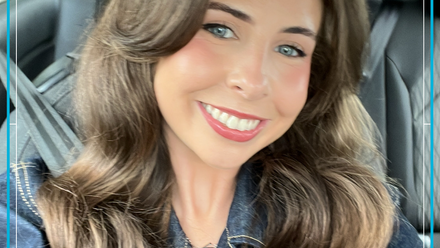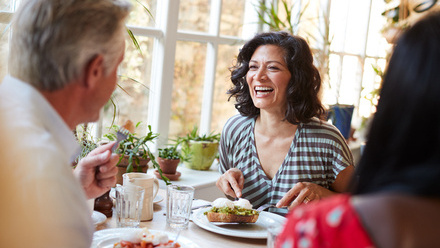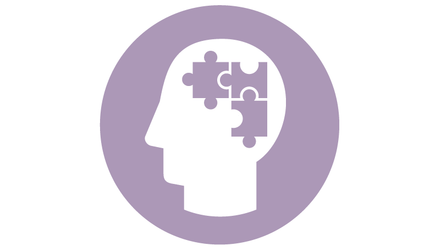Third year dietetic student Zunaira Awais shares her mental health struggles during placement and how she prioritised her wellbeing - as well as sharing tips for those on placement.
Like many students who had their A placement cancelled due to the pandemic, I was so excited to start my B placement and finally see what it’s like to work in my dream job. Feeling optimistic and confident, in mid September, I moved into a small, rural village – it was bliss.
Placement began. I had never been in a hospital ward before, so the first few weeks were a steep learning curve. I was constantly learning and observing something new, frantically making notes. It was always action time.
Surprisingly, I quickly realised that I preferred seeing outpatients as opposed to inpatients. Outpatient clinics are slower paced than the acute setting and you are able to speak to patients for longer. I really enjoyed educating others on dietary guidelines and negotiating goals.
Having had two weeks of online pre-placement preparation, impostor syndrome was something I never thought I would face, but I did. When prompted to talk to a patient or ask a doctor/nurse a question, an internal voice whispered, ‘Why me? I don’t know anything’, as though all my preparation simply, vanished. Being the perfectionist that I am, the hardest thing to deal with was constructive criticism. I would repeat these comments in my head, even at night, and as a result, it would affect my self-confidence.
These issues made keeping on top of my portfolio and performing to my best potential very challenging. This hit hard during my midway review, when I was told that I was not meeting enough learning outcomes. The following week, I was determined to prove I was competent. I ignored all the signs of my deteriorating mental health, such as isolating myself at home and suppressing and invalidating my thoughts and emotions. I stopped doing the activities I enjoyed because of the frantic thoughts inside my head.
As time went on, there were many external factors that I could not control such as my family getting COVID. I started to question whether dietetics was for me.
My worsening mental health was questioned by my supervising dietitians, but I was in denial – ‘No, I’m fine’, I often replied. I did not notice that I was truly struggling until it was mentioned again and again!
Ultimately, my supervisor and I agreed that it was best for me to stop placement and defer for a year. Although I did want to pass B-placement, I knew I would not be prepared for my C-placement if I was to continue like this. In my heart, I knew this break was necessary to allow me to work on regaining my self-confidence and finally prioritise my mental health. I know I did the absolute best given my circumstances.
I shared my experience of placement on my Instagram account. I was overwhelmed with the response from current students as well as dietitians who have had struggles with their mental health whilst on placement. Also, many dietitians shared that they had also re-done their placements!
To further raise awareness of this topic and help current students, I started a series on Instagram Live called ‘A Ray of Hope' for students struggling on placement with different Dietitians to answer questions from students. The second Q&A session was dedicated to questions regarding mental health on placement.
The biggest lesson I have learned from this experience is that there is no one route for all.
From the responses to my post, I learned that the path to becoming a dietitian is certainly not linear for all; there is no shame in taking a longer, more interesting route than our peers, because ultimately, we will all become well-rounded dietitians.
Zunaira’s tips for mental wellbeing during placement
Self-care is essential
The idea of doing one thing non-stop can feel overwhelming. Mixing things up and spending time on other activities can give us variety and avoid burnout and keep us fulfilled. Self-care is essential to allow our bodies to recover after each day. Be sure to do the things you enjoy throughout placement. Some of my favourite things are to do yoga or cycling, to provide mental clarity. By doing this, it will allow you to perform better the next day.
Do not isolate yourself
During placement, many of us are living alone for the first time and the bubble of placement be suffocating. I can’t emphasise enough how important it is to keep in regular contact with your family and friends. Isolating yourself will only worsen your mental health.
Comparing your experience to others is futile
Do not assume that all your friends are soaring through placement, because you do not know their experience unless you ask. As I discovered, many were going through similar struggles. So, make the first move and regularly check up on your peers.
Overcoming imposter syndrome
Separate the fact from fiction: you are supposed to be constantly learning on placement. Initially, it feels like you know nothing, but you are more knowledgeable than you think! Avoid having an inferiority complex - as an RD2B you are a valid member of the healthcare team. Remember, you have earned your place.
Don’t forget to enjoy yourself on placement
The immense pressure we put on ourselves to constantly prove we are competent means that we forget to enjoy placement. When I was enjoying myself, I engaged more and performed better!







